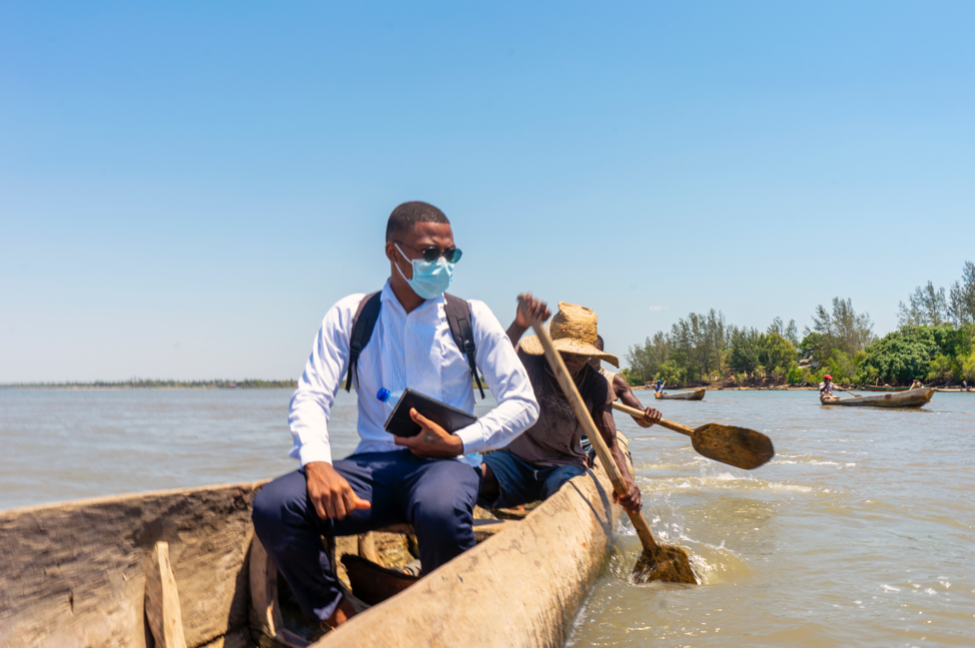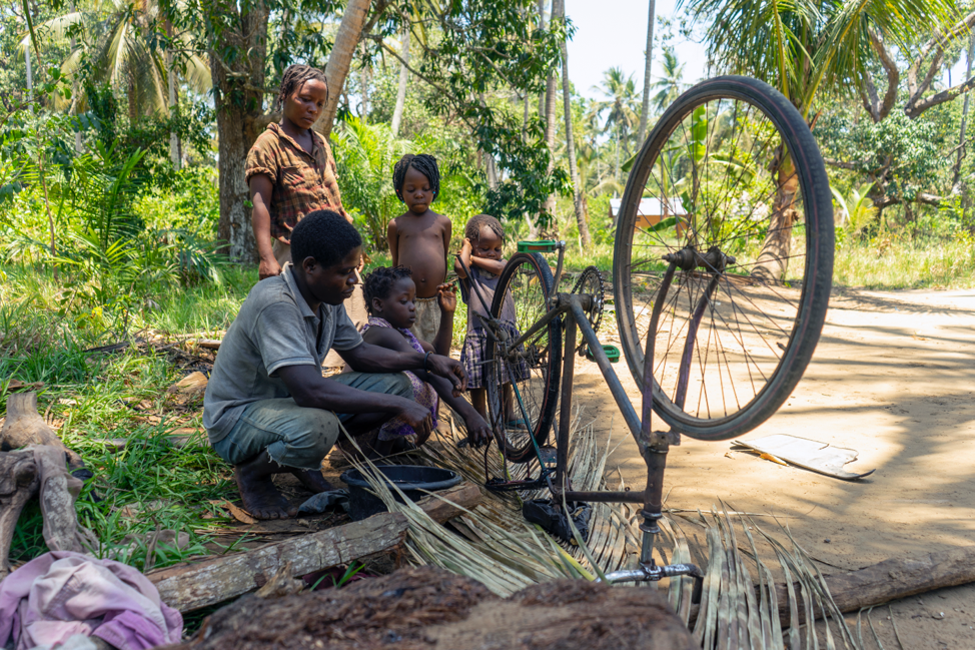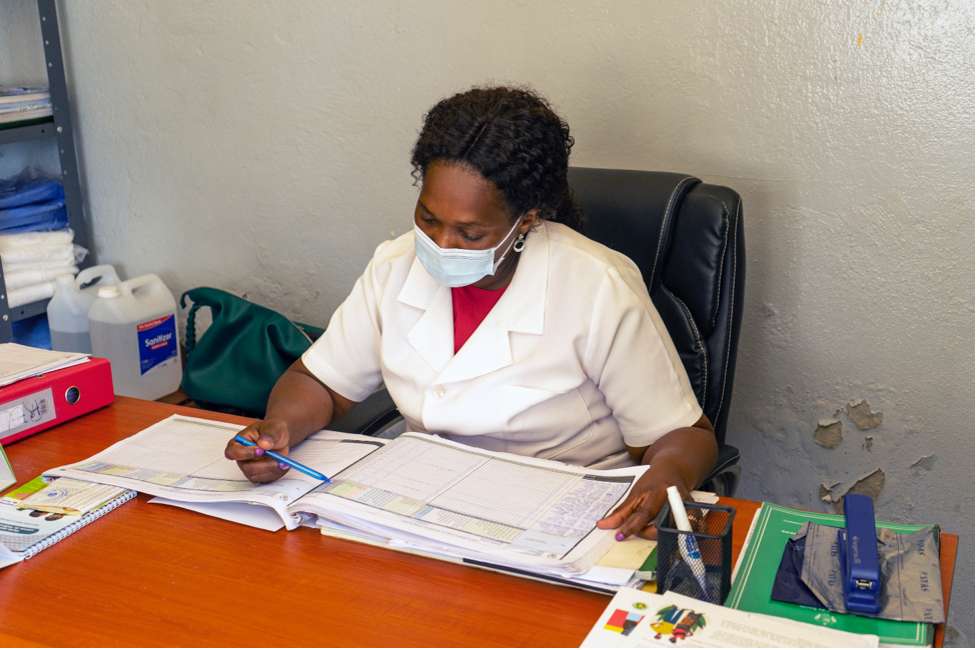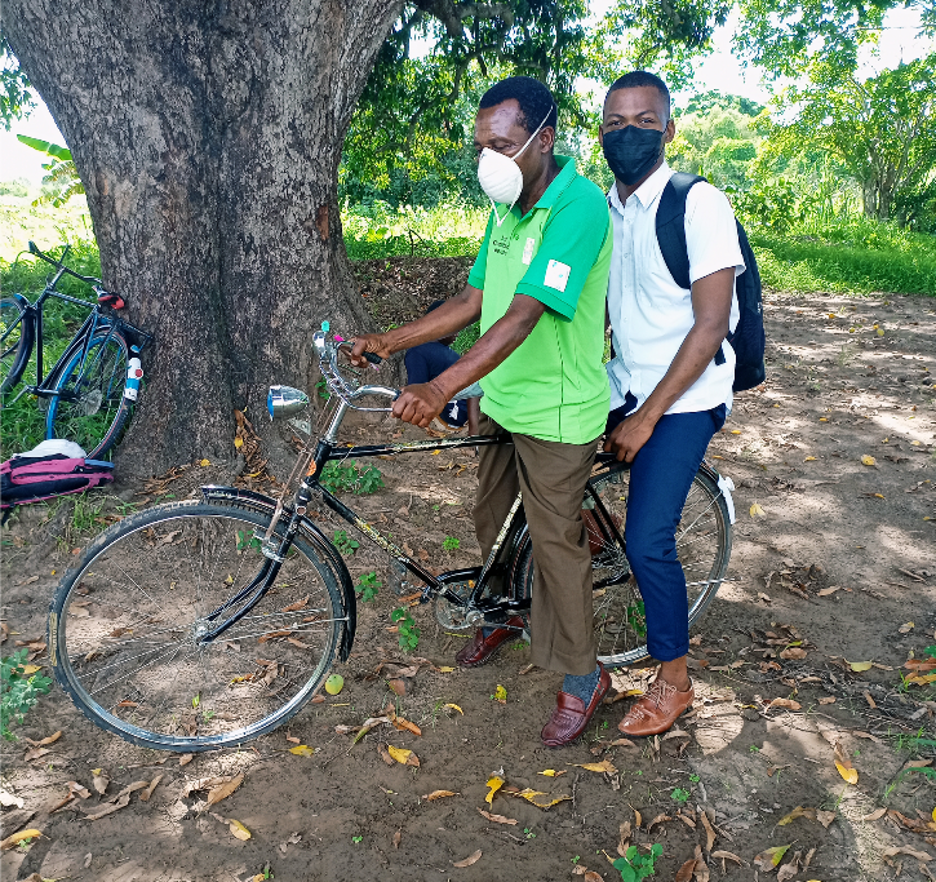
“Now I understand what COVID-19 is, how to protect myself, and what I need to do to continue my consultations and HIV medication.” Ticha Emiliano at Namuinho Health Facility, Quelimane District.
As on any other typical Saturday, Osvaldo Ramos Dias Movere begins his work crossing the Macuse River in a traditional canoe. When he arrives at Idugo Island, he catches a lift on the back of a Peer Educator’s bicycle. Together they make home visits to patients who have interrupted antiretroviral therapy (ART). Osvaldo is just one of 235 FGH-supported Clinical Officers who collectively visit thousands of patients daily, ensuring that COVID-19 does not hinder efforts to control the HIV epidemic in Zambézia Province.
“Weekends, particularly Saturdays, are the best days to find patients because that’s when they are normally at home after returning from tending their fields,” says Osvaldo.
A combination of factors has long been responsible for HIV treatment interruption, including lack of money for transportation, temporarily moving to lower terrain for better farming, travel during the holiday season, and stigma, among others. The COVID-19 pandemic has been an important new factor that has kept thousands of patients away from health facilities since March 2020.
This is how Mussa Mbeve, a patient receiving ART at Macuse Health Facility in Namacurra District, vividly recalls interrupting ART due to COVID-19: "Corona [COVID-19] was the reason I stopped going to the hospital. The government said people must not gather in large crowds in places such as mosques, [football] games... All ceremonies were stopped because of Corona [COVID-19]."
In a similar tone, a dozen miles away, Ticha Emiliano, a patient at Namuinho Health Facility in Maquival, Quelimane District, also told us she stopped going to the health facility for HIV Care & Treatment services due to fears of contracting COVID-19.

In her own words, “I was afraid of that disease… Corona [COVID-19]. I was afraid because of the news I had received, that people can no longer crowd together, thus, I was afraid to go into the health center because a lot of people go there. That’s what made me interrupt treatment.”
Thanks to the clarifications and assurances provided by clinicians such as Osvaldo, Ticha and Mussa, many other patients are now re-engaged in care and back on treatment. Osvaldo sits with patients who have interrupted treatment in their homes, providing psychosocial support sessions and delivering life-saving ART and TB preventive therapy (TPT). He enjoys the challenging nature of this work: “We are well prepared. We have bicycles, raincoats, boots, a backpack to carry the medications, and a logbook to register the ART delivery. We visit patients even when it rains. The boat pilot keeps rowing while someone else bails water out of the canoe with a plastic bottle during the journey across the river.”

Lussete Bissane, Director of Namuinho Health Facility, confirms that COVID-19 has negatively impacted the HIV program at her facility. “It was a result of information broadcasted on the radio that told people to stay at home. We started noticing that normal patient flow was decreasing, and we started noticing interruptions of ART not only for adults but for children as well. As the patient flow decreased, we realized something was wrong. Even pregnant women enrolled in the HIV program weren’t attending antenatal consultations.”
In response to this situation and in coordination with the provincial health authorities, FGH initiated Community-based ART distribution as a strategy to reach those patients who interrupted treatment during the COVID-19 pandemic. Clinical Officers were hired to visit patient homes, provide ART and Tuberculosis preventive therapy (TPT), reinforce ART adherence messages, and clearly instruct patients to visit their local health facility for their next consultation and medication pick-up. FGH trained and equipped Clinical Officers with bicycles, monitoring forms, and basic supplies like boots, raincoats, and backpacks. Communication activities, such as community radio messages and community theater performances, were also implemented to strengthen the acceptance of Community-based ART distribution.

Macuse Health Facility Interim Lead Jacinto Manuel Bata adds, “Community-based ART distribution is a very good initiative because it came to provide reinforcements, it recovered individuals who had interrupted treatment, or who had weak retention to HIV services.”
By the end of December 2021, 56,350 people were back on ART as a result of Community-based ART distribution, representing 18% of the total number of patients on ART (317,142) at FGH-supported health facilities.
These results were achieved through the Avante Program. Avante is funded by PEPFAR through the Centers for Prevention and Disease Control (CDC) and seeks to control the HIV epidemic by supporting the sustainable implementation of HIV and Tuberculosis (TB) services in the province of Zambézia. Avante is implemented by Vanderbilt University Medical Center (VUMC) and its affiliated Friends in Global Health (FGH) which work in partnership with the Government of Mozambique at the national, provincial, district, health facility, and community levels.